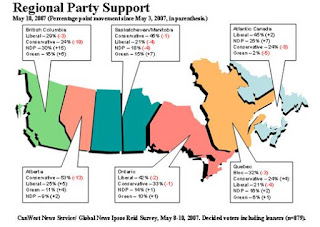Remember back, during the lead-up to Gulf War II and the U.S. invasion of Iraq, when Canada was trying to decide whether or not to participate in the U.S. ‘coalition of the willing’?
The drumbeat to go to war was blaring strong. Then opposition leader Stephen Harper led the way. And he was backed whole-heartedly and full-throatedly by the Canadian media establishment. All over the airwaves, and all over the newspaper editorial pages, we were told we had to go to war, we had no choice, and we had to get those weapons of mass destruction, yada yada. There was hardly a dissenting voice in the establishment chorus.
Judging by the media coverage, you’d have thought the whole nation was clamoring for vengeance. And the media was certainly shocked when Prime Minister Jean Chretien made one of the best decisions of his career, and decided to keep Canada out of Iraq.
The media brayed and Stephen Harper went on Fox News to make excuses for Canadians. And Canadians? We applauded a leader that had listened to us, and not the editorial writers and intelligentsia. Chretien knew that despite what the media wanted, Canadians wanted no part of this war. I was never more proud of Chretien than I was then, and I was far from alone.
That lesson of listening to the people, and not the media establishment, is an important one. And it’s one we should remember as we gear-up for a highly politicized debate on the future of the Afghan mission, and the inevitable stay the course, don’t cut and run rhetoric that is sure to follow.
Remember where Canadians actually are on these issues. While polling is an inexact science, these numbers Kady O’Malley pulled-out from an Ipsos-Reid survey on the Manley report should be noted:
On Canada's mission to Afghanistan, in 2009 when our military mission is supposed to finish, which of the following would you be most likely to support? The government should either...
Bring all of our troops home: 37%
Extend our current role and mission as required: 14%
Keep troops there but have them do something like train Afghani soldiers or police officers: 45%
Don't know/Refused: 4%
As you can see, 45 per cent support the Liberal position. A position that has been steady and unwavering since Dion became leader, BTW, despite the Conservative and pundit spin. Just 14 per cent favour an open-ended combat mission, the Conservative position.
As the Conservative and
media spin machine gears-up, just remember that two-thirds of Canadians don’t support the recommendations of the Manley report. They're the ones we should be listening to, not the media or Stephen Harper.
Canadians are proud of our military members, and the important work they've done. But they also believe we've done our duty, and it's time for another country to step up to the plate. They're willing to accept a training/rebuilding role, but otherwise they say bring them home.
We’re on firmer ground here then many seem to think. Let's not forget that. I wouldn't want to fight an election on this one if I was Stephen Harper.
UPDATE: With similar thoughts are
Jason Cherniak and
Warren Kinsella. Warren outlines the possible Liberal election pitch well:
“Hi, I’m Stéphane, and I think we have more than done our bit in Afghanistan, and we think it’s time for other countries to step up to the front line, and if you elect me, we will push for that. But if you want to be over there forever, with no end date, by all means vote for the other guy. Oh, and the economy. The other guys have no economic plan for the tough times ahead, none at all, and we do,” etc







